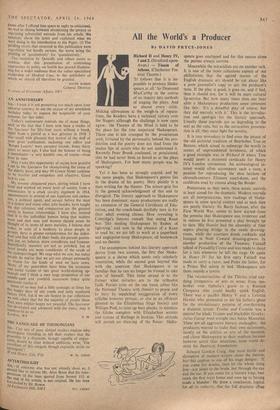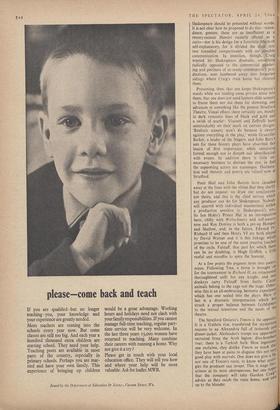All the World's a Producer
By DAVID PRYCE-ZONES
Richard II and Henry IV, 1 and 2. (Stratford-upon- Avon.) — Timon of Athens. (Chichester Fes- tival Theatre.)
'IT follows that it is im- possible to produce Shake- speare,at all.' So Desmond MacCarthy in the course of an inquiry into methods of staging the plays. And so almost every critic. Making allowances at the weigh-in of reputa- tions, the Readers have a technical victory over the Stagers although the challenge is now open again: the Theatre of the Mind is held to be the place for the true majestical Shakespeare. There one is not cramped by the proscenium arch, irritated by the personality behind the pro- duction and the poetry does not thud from the leaden lips of actors who do not understand it. Recently Peter Brook confessed, or proclaimed, that he had never been so bored as at the plays of Shakespeare. For how many people was he speaking?
Yet it has been as strongly argued, and by the same people, that Shakespeare's genius lies in the drama of his poetry. Here plainly is a man writing for the theatre. The scissor-grip lies in the general acknowledgment of this and its disregard. The literary approach to Shakespeare has been dominant; many productions are really an extension of the General Certificate of Edu- cation, and the coach-loads dutifully turn in for their adult evening classes. How revealing is Coleridge's famous remark that seeing Kean was 'like reading Shakespeare by flashes of lightning,' and now in the absence of a Kean to read by, we are left to work at a paperback and anglepoise-lamp Shakespeare, all homework and no theatre.
The assumptions behind this literary approach derive from two sources, the first that Shake- speare is a shrine which needs only scholarly veneration, while the second goes beyond this with the assertion that Shakespeare is so familiar that he can no longer be trusted to take care of himself. This latter strand is to the former what miracles are to the orthodox faith. Purists arise on the one hand, either like the National Theatre with Hamlet to praise and to bury by sepulchral exaggeration or every syllable however prosaic, or else in an offshoot ghosted. by the Elizabethan Stage Society and William Pool, to raise up bare planks, to simulate the Globe complete with Elizabethan accents and visions of Burbage in buskins. This attitude will permit no shearing of the fleece: Shake- speare goes unclipped and for this reason alone the purists always survive.
Meanwhile the miraculists are on another tack. It is one of the more ridiculous aspects of our philistinism that the agreed master of the English dramatic art should be cut about like a poor journalist's copy to suit the producer's taste. If the play is good, it goes on, and if bad, then it should not, for it will be mere cultural lip-service. But how many times does one hear after a Shakespeare production some comment like this: 'It's a dreadful play of course, but they did marvels with it.' This is the introduc- tion and apologia for the literary approach. Usually these marvels are as degrading to the text as the cuts, but to the miraculists presenta- tion is all; they must fight for novelty.
It is rare nowadays to find even the jetsam of the•old pictorial tradition of Beerbohm Tree or Benson, which aimed to submerge the words in scenes of unprecedented lavishness, of which a good example was in Richard II where Tree would insert a mounted cavalcade for Henry IV's London coronation. An archaeological in- terest would often accompany such a taste, a passion for reproducing the shoe latchets of .eleventh-century Elsinore court-dress, and the cauldrons used by covens along the Border.
Pretentious as they were, these scenic marvels at least aimed for the dramatic. Modern marvels are all interpretations, new readings of Shake- speare in some special context and as such they are purely literary. Sir Barry Jackson, after the First World War, seems to have started from the premise that Shakespeare was irrelevant and in redress he first presented a play brought up to date. His Hamlet had the absurdity of four supers playing bridge in the castle drawing- room, while the courtiers drank cocktails and lounged in Noel Coward dressing-gowns. In another production of the Twenties, Falstaff talked of Piccadilly Circus and was made to shout for a taxi whenever he left the stage. Or again in Henry IV for his first entry Falstaff was made to carry a razor, and Poins the lather, for a Prince Hal asleep in bed. Shakespeare sets them outside a tavern.
The reconstructions of the Thirties tried any- thing irrespective of text or sense, from um- brellas over Ophelia's grave to a Russian Cleopatra who could hardly speak English. There was a pacifist Henry V and a Leninist Hamlet who pretended to see his father's ghost for the revolutionary purpose of overthrowing a dialectic tyrant. Troilus and Cressida was a natural for khaki Trojans and blackshirt Greeks: Julius Caesar went straight into Julius Mussolini. These are all aggressive literary onslaughts: the producers wanted to make their own statements, mostly on the politics or arts of the moment, and chose Shakespeare as their medium because however astral their intentions, none could de- stroy his theatrical foundations.
Edward Gordon Craig, that most fertile and disruptive of modern writers about the theatre, has this caption to one of his stage designs: If you
come for drama, then let the whole thing live—not alone to the brain, but through the eye and the ear. If you come for a literary treat, best catch the first train home and own up to having made a blunder.' He drew a conclusion, logical for all its reductio, that for full dramatic effect Shakespeare should be presented without words. It is not clear how he proposed to do this—mime. dance, gesture, these are as insufficient as a twenty-minute Hamlet recently offered as a curio—iior is his design for a futuristic Macbeth self-explanatory, for it divided the stage into two tunnelled compartments with no possible communication. In intention, though, Craig wanted his Shakespeare dramatic, something radically opposed to the commercial pander- ing and pettiness of so many contemporary pi o- duotions, now lumbered away • into forgotten sidings where Craig's train home has shunted them.
Presuming, then, that one keeps Shakespeare's words while not reading some private sense into them, that one does not need lantern-slide scenery to frame them nor use them for clowning, one advances to something like the present Stratford Theatre. Visual effects there certainly are, mostly in dark romantic hues of black and gold and a swish of scarlet: Visconti and Zeffirelli have unmistakably set their mark on current designs. `Realistic scenery won't do because it swears against everything in the play,' wrote Granville- Barker, a leader of the Stagers, and John Bury's sets for these history plays have absorbed this lesson of first importance, while remaining formal enough not to disturb our identification with events. In addition there is little un- necessary business to distract the eye, in fact the supporting actors are statuesque. Declatur tion and rhetoric and poetry are valued now at Stratford.
Peter Hall and John Barton. have chiselled
away at the lines with the virtue that they clarify but do not impose; we draw our conclusions, not theirs, and this is the chief service which any producer can do for Shakespeare. Nobody will quarrel with individual mannerisms within a production sensitive to Shakespeare's text. So Ian Holm's Prince Hal is an introspective hero, chilly with Weltschmerz and self-aware- ness and Roy Dotrice is both a pin-up Hotspur and Shallow, and, in the future, Edward IV. Richard II and then Henry VI are both played by David Warner and it is this linkage which promises to be one of the most creative touches of the cycle. Falstaff, that part for which there can be no doubling, is Hugh Griffith, a little rueful and maudlin to spice the humour.
At a few points the pageant turns into panto- mime. Following Tree, a horse is brought on for the tournament in Richard 11, an ornamental thoroughbred unfit for any knight, and tw° donkeys carry Falstaff from battle. Circus animals belong to the cage not the stage. Other' wise this is an all-embracing, hermetic experience which has one sealed into the plays. Here al last is a dramatic interpretation which has struck a proper balance between faithfulness to the textual intentions and the needs of the theatre.
The Stratford Ontario's Tinton is the opposite' It is a Guthrie riot, transferred for mysterious, reasons to an Alexandria full of tarboosh and , dinner-jacket. Alcibiades's troops are apparently recruited from the Arab legion; dive-bombs, roar; there is a Turkish bath. How ingenious; one exclaims, they dislike Thrum so much the they have been at pains to disguise this not WY good play with marvels. One does not give a fig' nor one of Timon's roots, to know what anal!: gies the producer can invent. This is stage liter• ariness at its most obstreperous, but one 1100,,5 that the company will take Gordon Craig0 advice as they catch the train home, and ov' up to the blunder.







































 Previous page
Previous page